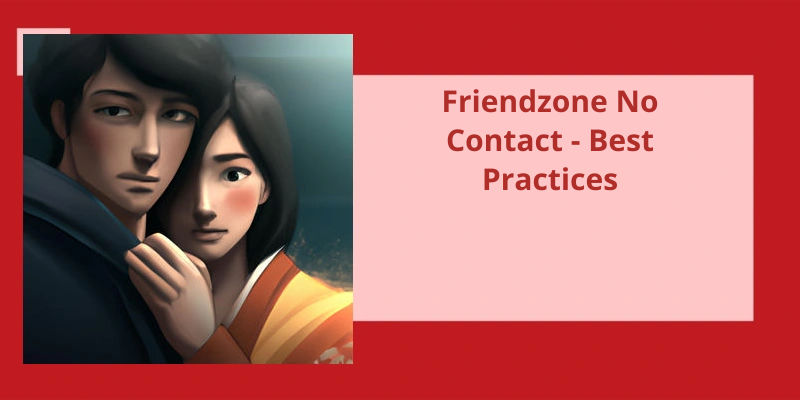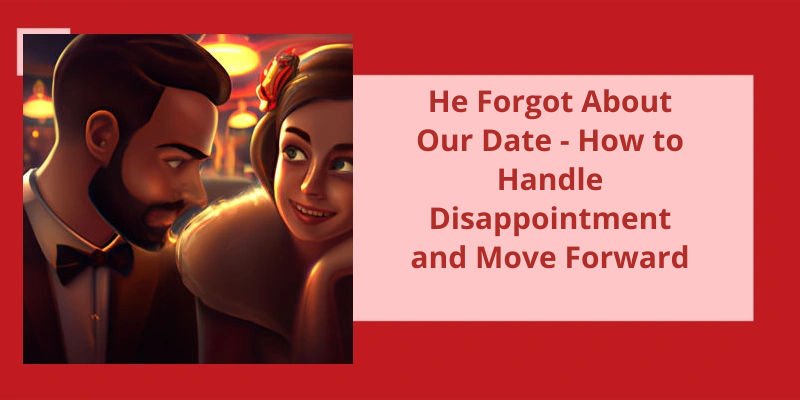Friendzone No Contact – Best Practices. Navigating the treacherous waters of the friendzone can be a daunting task, filled with uncertainty, mixed emotions, and the constant question of whether there's a chance for something more. For those who find themselves stuck in this frustrating limbo, implementing a strategy known as "Friendzone No Contact" can be a game-changer. The concept revolves around creating distance and breaking the pattern of constant communication in order to regain a sense of self-worth and potentially shift the dynamics of the relationship. However, mastering the art of Friendzone No Contact requires careful planning, emotional resilience, and a thorough understanding of the best practices that can increase the chances of success. From respecting personal boundaries to focusing on personal growth, this guide will explore the key strategies and techniques to help individuals navigate the friendzone with grace and dignity.
Is It Okay to Friendzone Someone Over Text?
When it comes to friend-zoning someone, it’s essential to be honest and direct in your approach. While face-to-face conversations might be considered more personal and authentic, friend-zoning over text can also be a viable option. It allows you to express your intentions clearly without beating around the bush or leaving the other person with any false hopes.
While there’s no denying that in-person interactions can be emotionally challenging, friend-zoning over text can facilitate a more comfortable and controlled environment for both parties involved. Through open and honest communication, you can clearly convey that you aren’t interested in pursuing anything beyond friendship. This eliminates any ambiguity or potential misunderstandings that may arise from subtler forms of rejection.
By choosing to friend-zone someone over text, you’re provided with the opportunity to carefully select your words, ensuring that your message is conveyed in a considerate and respectful manner. Taking the time to compose your thoughts can prevent unintended hurt feelings or confusion. Additionally, the text format allows the other person to process the information at their own pace and in a more private setting.
It’s important to remember that friend-zoning someone should always be approached with compassion and sensitivity. It’s crucial to be clear about your intentions and avoid giving mixed signals. Regardless of whether you choose to friend-zone someone in person or via text, using a direct and straightforward approach can facilitate a more amicable resolution, allowing both parties to move forward in a healthy and respectful manner. Ultimately, the method you choose depends on your personal preference and what you believe is the most respectful way to handle the situation.
The Importance of Empathy and Understanding When Friend-Zoning Someone.
When it comes to friend-zoning someone, it’s crucial to approach the situation with empathy and understanding. Recognize that rejecting someone’s romantic advances can be difficult for them, and it’s important to be considerate of their feelings.
Communicate your feelings honestly but kindly, making it clear that you value their friendship and want to maintain that connection. Take the time to listen to their perspective and offer support during this challenging time.
Remember that everyone deserves respect and understanding, even in the friendzone. By approaching the situation with empathy, you can minimize hurt feelings and foster a healthy foundation for your friendship moving forward.
The toxicity of the friendzone lies within it’s deceptive nature, masquerading as a harmless connection while harboring unrequited feelings. It can lead to resentment, emotional manipulation, and even the erosion of genuine friendship. Understanding the underlying dynamics of the friendzone is crucial in navigating relationships and ensuring mutual respect.
How Toxic Is Friendzone?
The friendzone, often seen as a harmless term, can actually be quite toxic. It isn’t a place of acceptance, as some may perceive it to be, but rather a state of wilful denial. It’s a situation in which one person has made their intentions clear, expressing that they only see the other as a friend, yet the other person chooses to stick around, unsatisfied with this declaration. They hold onto the hope that the other person will change their mind or be persuaded otherwise.
The person in the friendzone may constantly feel invalidated and unvalued, as their feelings are dismissed or overshadowed by the other persons lack of romantic interest. This can lead to a deep sense of longing and frustration, as they constantly hope for a shift in the relationship dynamics.
It’s important to note that being in the friendzone doesn’t guarantee a change in the relationship dynamics. Hoping for someones feelings to change or trying to convince them to see you differently isn’t only unfair to yourself but also to the other person. It’s crucial to respect their boundaries and accept their decision, even if it may be painful.
To navigate the friendzone in a healthy way, it’s often recommended to practice no contact. This means taking a break from the friendship and dedicating time and energy to self-healing and personal growth. By focusing on oneself and creating distance from the unrequited feelings, it becomes easier to gain clarity and potentially find new perspectives.
Overall, while the friendzone may seem harmless on the surface, it can have significant negative impacts on ones emotional well-being. It’s crucial to recognize when it becomes toxic and take steps towards healing and moving forward. Respect, boundaries, and self-care are key in navigating these complex situations.
Source: When did the friend zone become a toxic thing?..
When it comes to friend-zoning someone you’ve feelings for, it can be a challenging and delicate situation. However, with the right approach, you can maintain the friendship while setting clear boundaries. Honesty is key, as well as avoiding false hope and giving the person time to get over their feelings. Respect, hanging out in groups, and not using them are all important factors. Additionally, it’s important to limit constant communication and remind them of the platonic nature of your relationship.
How Do You Friend Zone Someone Who You Have Feelings for but Still Keep Them as a Friend?
When it comes to navigating the tricky territory of friend zoning someone you’ve romantic feelings for, it’s important to approach the situation with honesty and respect. Being straightforward and direct about your feelings is often necessary in order to establish clear boundaries. It may feel uncomfortable, but avoiding false hope is crucial in order to allow the other person to move on and find someone who reciprocates their feelings.
One of the best practices when friend zoning someone is to give them the space and time to get over you. This means not leading them on or sending mixed signals that could potentially reignite their feelings. It’s important to be mindful of their emotions and let them process and heal in their own time.
Respect is key in maintaining a healthy friendship after friend zoning someone. Treat them with kindness and consideration, and avoid treating them as a backup option or using them for emotional support without reciprocating their feelings. It’s essential to value their friendship and make it clear that you still care about them, just in a platonic way.
When spending time together, it can be helpful to hang out in group settings rather than one-on-one. This can help establish clear boundaries and prevent any confusion or misunderstandings. By maintaining a group dynamic, it allows for a more relaxed atmosphere and helps to reinforce the platonic nature of the relationship.
Additionally, limit your communication with them. Dont engage in constant texting or spend hours talking on the phone. This can help prevent any blurred lines and avoid leading them on. It’s important to establish a new dynamic in the friendship that’s focused on mutual interests and shared experiences, rather than solely romantic feelings.
Finally, it can be helpful to remind them of the friend zone every now and then. This doesn’t mean rubbing it in their face, but rather gently reminding them that you value their friendship but don’t have romantic feelings. By continuously reinforcing the platonic nature of the relationship, it can help both parties move forward and enjoy a healthy friendship.
Communication: Discussing Your Feelings Openly and Honestly With the Person You Are Friend Zoning Can Help Them Understand Your Perspective and Establish Clear Boundaries.
- Communication: Discussing your feelings openly and honestly with the person you’re friend zoning can help them understand your perspective and establish clear boundaries.
Is it painful to be in the Friendzone? This question might seem trivial to some, but those who’ve experienced it firsthand understand the emotional toll it can take. The friend zone, often seen as a form of social rejection, can often lead to a discomfort that’s akin to physical pain. It’s important to recognize and empathize with the emotions involved, as they can have a profound impact on an individual’s well-being and relationships.
Is It Painful to Be in the Friendzone?
Is it painful to be in the Friendzone? This is a question that many individuals ponder. While some may argue that the heartache experienced in the friend zone is merely emotional, a closer examination reveals that it can be much more than that. In fact, the friend zone can be a form of social rejection, which can cause a hurt similar to physical pain.
When we find ourselves relegated to the friend zone, it can feel as though our romantic aspirations have been thwarted. We may have invested time, effort, and emotional energy into building a connection with someone, only to be labeled as nothing more than a friend. In this situation, it’s only natural to feel a sense of loss and disappointment. It’s like having the person you desire so close, yet so far away.
The pain of the friend zone extends beyond mere emotional upset. Psychological research has shown that social rejection activates the same areas of our brain associated with physical pain. This may explain why individuals in the friend zone often experience feelings of sadness, loneliness, and even self-doubt. It can feel like a rejection of not just our romantic feelings, but our worth as a person.
Navigating the friend zone can be tricky, as staying in contact with the person we’ve feelings for can perpetuate our emotional distress. Many experts recommend implementing a period of no contact to allow for healing and regaining a sense of self-worth. By removing ourselves from the situation, we can gain clarity and perspective, and even explore new experiences and relationships. No contact also creates an opportunity for the other person to realize what they might be missing and potentially reconsider their feelings.
The Difference Between a Genuine Friendship and Being in the Friend Zone
- A genuine friendship involves mutual respect, trust, and support.
- Being in the friend zone typically refers to a situation where one person has romantic feelings for another, but the relationship remains platonic.
- In a genuine friendship, both parties genuinely care about each other’s well-being and enjoy spending time together.
- In the friend zone, one person may feel trapped or unfulfilled because their romantic feelings aren’t reciprocated.
- Genuine friendships can develop naturally over time and are based on shared interests, values, and emotional connection.
- Being in the friend zone can happen when one person sees the other only as a friend and doesn’t have romantic or sexual interest in the person.
- In a genuine friendship, there’s no expectation of romantic involvement, and both individuals are happy with the platonic nature of the relationship.
- The friend zone can lead to feelings of frustration, rejection, and unrequited love.
- Genuine friendships are built on mutual understanding and acceptance, while being in the friend zone often involves unbalanced feelings and unreciprocated emotions.
- In a genuine friendship, both parties are comfortable being themselves and can share personal thoughts and feelings without fear of judgment.
Additionally, setting clear boundaries and openly communicating about your feelings can help in navigating the transition from potential romance to a platonic friendship. By being respectful and understanding, you can preserve the friendship and potentially even strengthen it.
Can You Stay Friends After Being Friendzoned?
Can you stay friends after being friendzoned? Maintaining a friendship with someone who’s romantic feelings may be difficult at first, but it’s possible if you do a few things correctly. One of the best practices is to ensure that you establish clear boundaries from the start. This means having open and honest conversations about your feelings and intentions, and understanding and respecting each others boundaries. It’s important to recognize that even if one person is in love with the other, it doesn’t have to be the end of the friendship.
Another crucial aspect is to give yourselves time and space to heal. It can be challenging to move past unrequited feelings, so taking a break from each other and allowing yourself to process your emotions can be beneficial. During this period, it might be a good idea to limit contact and refrain from engaging in activities that might fuel romantic attachment.
To maintain a platonic friendship, it can be helpful to focus on shared interests and create new memories together. By shifting the focus away from romantic feelings, you can build a strong foundation based on commonalities and shared experiences. Also, it might be a good idea to invite other friends when you spend time with the friend-zoned friend to provide some healthy distractions for both of you. This can help create a more comfortable environment and prevent any awkwardness.
Communication is key in any relationship, including a friendship after being friendzoned. It’s important to keep the lines of communication open and honest, discussing any concerns or uncomfortable feelings that may arise. By being transparent with each other, you can address any potential issues and work together to maintain a healthy and supportive friendship.
By setting clear boundaries, giving yourselves space to heal, focusing on shared interests, involving other friends, and maintaining open communication, you can establish a strong foundation for a meaningful and fulfilling friendship.
Dealing With Jealousy: How to Handle Feelings of Jealousy When Maintaining a Friendship After Being Friendzoned.
When maintaining a friendship after being friendzoned, it’s common to experience feelings of jealousy. To handle these emotions, it’s important to practice self-awareness and communicate openly with your friend. Recognize that jealousy is a normal emotion but try not to dwell on it. Instead, focus on building your own self-confidence and finding happiness outside of the friendship. Avoid comparing yourself to others and remember that everyone’s journey is unique. Stay positive, be supportive of your friend’s happiness, and don’t hesitate to seek support from trusted friends or a therapist if needed.
Conclusion
In conclusion, navigating the friendzone and implementing the no contact rule requires a thoughtful approach that balances self-respect and consideration for the other person involved. By focusing on personal growth, maintaining boundaries, and fostering open communication, individuals can effectively deal with the complexities of being friendzoned. It’s crucial to remember that while the no contact rule can be a beneficial tool in certain situations, it may not be the right choice for everyone. Each person's journey through the friendzone is unique, and by utilizing the best practices discussed, individuals can find empowerment and clarity, regardless of the outcome. Ultimately, the friendzone shouldn’t be seen as a negative experience, but rather an opportunity for personal development and learning.






